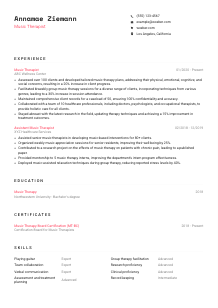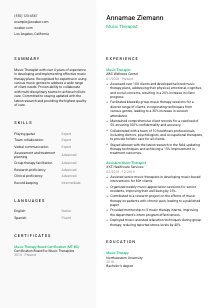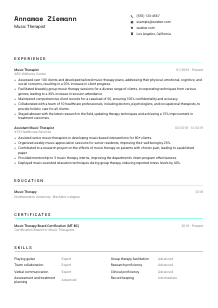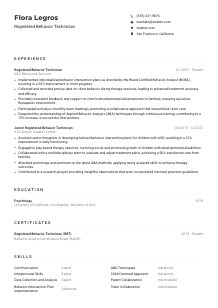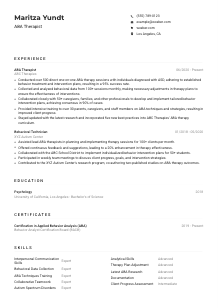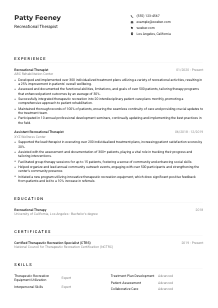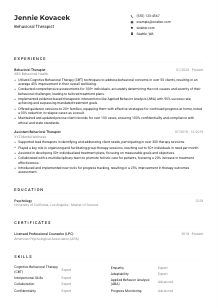Music Therapist Resume Example
Harmonizing hearts, but your resume isn't striking the right chord? Dive into this Music Therapist resume example, composed with Wozber free resume builder. Uncover how you can orchestrate your therapeutic talents to resonate with job requisites, setting your career on a tune-fulfilling path!
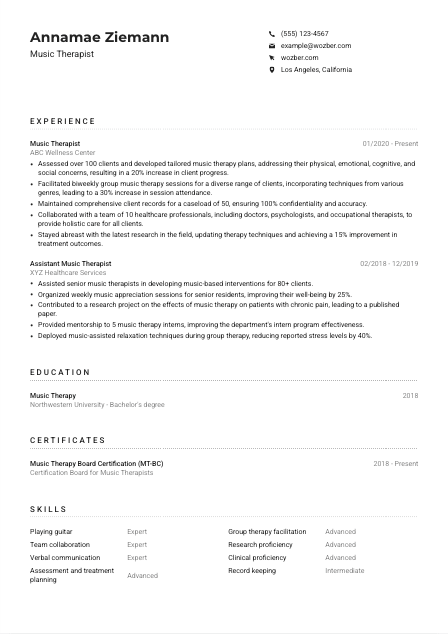
How to write a Music Therapist Resume?
Welcome, future Music Therapy maestro! In the orchestra of the job market, your resume is the opus that showcases your unique composition of skills, experience, and education. With the guiding baton of Wozber, you're about to craft a masterpiece that sings in harmony with the specific needs of your dream job as a Music Therapist. Employing our free resume builder and diving deep into the nuances of ATS optimization, let's embark on a melodious journey to fine-tune your resume into an awe-inspiring symphony that captivates the very soul of potential employers.
Personal Details
Imagine the Personal Details section of your resume as the opening act. It sets the stage, grabs the audience's attention, and provides a glimpse into the performance to follow. For a role as dynamic and soulful as a Music Therapist, your introduction should strike the right chord from the get-go. Here's how to ensure your personal details resonate.
1. Spotlight Your Name
Your name is the title of your symphony. Ensure it's boldly highlighted, creating an immediate, strong presence. This is not the place to be shy; let your name shine in a clear, readable font.
2. Echo the Job Title
Directly below your name, harmonize with the position by echoing the job title, 'Music Therapist'. This not only demonstrates alignment with the role but also tunes the hiring manager's attention to your specialized expertise.
3. Conduct Your Contact Information
Orchestrate your contact details with precision. A professional email and a direct contact number are essentials. Double-check for accuracy; a missed note here can mean a missed opportunity.
4. Note the Required Location
Since the role specifies 'Must be located in Los Angeles, CA', make sure to include your city and state. It confirms your eligibility regarding the location requirement, ensuring no discord in the logistical harmony.
5. Add a Crescendo with a Professional Profile
If you have a professional website or a LinkedIn profile showcasing your portfolio or endorsements from clients and colleagues, include it. This is your crescendo, adding depth and richness by giving the hiring manager a fuller view of your professional symphony.
Takeaway
The Personal Details section is more than a mere introduction; it's a powerful prelude that sets the tone for your entire resume. Think of it as your handshake before the curtain rises, creating anticipation for the performance that follows. Perfect it, and you'll have the audience – in this case, potential employers – eagerly awaiting the rest of your symphony.





Experience
The Experience section is where the crescendos and diminuendos of your professional journey create a compelling story. In the symphony that is your career, each position you've held adds a unique tone and texture. For the Music Therapist role, demonstrating harmony between your experience and the job's requirements is crucial. Let's compose this with precision.
- Assessed over 100 clients and developed tailored music therapy plans, addressing their physical, emotional, cognitive, and social concerns, resulting in a 20% increase in client progress.
- Facilitated biweekly group music therapy sessions for a diverse range of clients, incorporating techniques from various genres, leading to a 30% increase in session attendance.
- Maintained comprehensive client records for a caseload of 50, ensuring 100% confidentiality and accuracy.
- Collaborated with a team of 10 healthcare professionals, including doctors, psychologists, and occupational therapists, to provide holistic care for all clients.
- Stayed abreast with the latest research in the field, updating therapy techniques and achieving a 15% improvement in treatment outcomes.
- Assisted senior music therapists in developing music‑based interventions for 80+ clients.
- Organized weekly music appreciation sessions for senior residents, improving their well‑being by 25%.
- Contributed to a research project on the effects of music therapy on patients with chronic pain, leading to a published paper.
- Provided mentorship to 5 music therapy interns, improving the department's intern program effectiveness.
- Deployed music‑assisted relaxation techniques during group therapy, reducing reported stress levels by 40%.
1. Unpack the Job Score
First, conduct a thorough analysis of the job description. Identify key experiences and phrases. For instance, 'Facilitated group and individual music therapy sessions' or 'Collaborated with interdisciplinary teams' are melodies that should resonate throughout your experience.
2. Structure Your Opus
Arrange your experiences like movements in a concerto – start with the most recent and impactful. The role, organization, and dates form the basic chords of each entry.
3. Compose Achievement Arias
For each role, draft bullet points that sing of your accomplishments. Link them directly to the job requirements, using metrics where possible. For example, 'Assessed over 100 clients' meshes perfectly with 'Assess the needs of clients'.
4. Amplify Impact with Numbers
Numerical achievements are the high notes that grab attention. Whether it's the percentage improvement in client progress or the number of professionals collaborated with, these figures add depth and demonstrate the scale of your impact.
5. Maintain Thematic Relevance
Keep the recital focused on your role as a Music Therapist. Extraneous details, like unrelated job titles or skills, can muddle the melody. Ensure every line harmonizes with the essence of the position you're applying for.
Takeaway
Transform your experience section into a captivating cadenza that captures the breadth and depth of your professional journey. Each bullet point is a note in the melody that is your career, contributing to a harmonious whole that resonates with the essence of the Music Therapist role. With thorough composition and strategic arrangement, your experience will sing to the hearts of hiring managers.
Education
In the symphony of your Music Therapist resume, the Education section is the foundational bassline that supports the melody – your work experience. Harmonizing your educational qualifications with the requirements of the job strikes a chord of assurance with hiring managers. Let's orchestrate this section with precision.
1. Identify the Keynote
Start by pinpointing the educational requirements from the job posting. The role demands a 'Bachelor's degree in Music Therapy, Music, or a related field.' Ensure your degree harmonizes perfectly with this requirement.
2. Compose with Clarity
Structure your educational background like sheet music – clear, concise, and easy to follow. Include the degree, the institution, and the graduation year, enabling the reader to follow along without missing a beat.
3. Fine-tune Your Degree Details
If your degree directly matches the job requirement, place it center stage. A 'Bachelor's degree in Music Therapy' should be proudly displayed, resonating with the specific demands of the role.
4. Embellish with Relevant Courses, If Any
In certain cases, mentioning specific coursework can add depth to your educational narrative, especially if it directly aligns with job specifics. If you specialized in a relevant area, let it be a trill that enhances your educational melody.
5. Highlight Academic Crescendos
Did you graduate with honors, lead a noteworthy project, or partake in clubs relevant to Music Therapy? These are your crescendos – moments of peak achievement that add richness and texture to your educational background.
Takeaway
The Education section, when harmonized with the job's requirements, underscores your foundational knowledge and preparedness for the role. It's not merely a listing of degrees but a concordant part of your professional symphony that showcases your readiness to excel as a Music Therapist. Tune it to perfection, and let it bolster the melody of your career narrative.
Certificates
In the world of Music Therapy, certifications can be those high notes that truly make your resume sing. They underscore your commitment to your craft and continuous professional development. Specifically, for a Music Therapist role, certain certifications can set the rhythm for success. Let's delve into how to amplify your resume with the right certifications.
1. Score the Requisite Certifications
Revisit the job description to identify any certifications explicitly required or preferred. The 'Board Certification in Music Therapy (MT-BC)' is a prime example, underscoring your proficiency and dedication to the field.
2. Select Certifications that Harmonize with the Role
In the symphony of your resume, include certifications that directly resonate with the job you're applying for. Quality trumps quantity. A relevant, well-regarded certification can be a powerful solo that captures a hiring manager's attention.
3. Play the Timelines
For certifications, especially those that require renewal, keeping the timelines in tune is crucial. If your MT-BC designation is current, trumpet this achievement and its date, ensuring your qualifications strike the right note with current standards.
4. Pursue Continuous Learning and Certification
The music therapy field evolves, and so should your certifications. Stay attuned to new advancements, additional certifications, or renewal requirements. This commitment to professional growth is an aria that adds depth to your resume.
Takeaway
Your certifications are not merely bullet points on your resume; they are fortissimos that highlight your commitment and expertise in the field of Music Therapy. By selecting the right certifications and presenting them convincingly, you showcase a continuous crescendo in your professional development. Let these accomplishments ring loud and clear.
Skills
The Skills section is the virtuoso solo in the performance of your Music Therapist resume. It's where you get to showcase your technical prowess, your ability to connect with clients, and your professionalism. Harmonizing your skills with the job requirements creates a compelling narrative that resonates with hiring managers. Let's dive into crafting a skills section that hits every note perfectly.
1. Decipher the Job Composition
Start by dissecting the job description for both explicit and implicit skills required. 'Strong proficiency in playing at least one instrument' and 'Exceptional interpersonal and communication skills' are examples of skills that you should echo in your resume.
2. List Skills that Play in Harmony
Align your skills with the job's demands. Include both hard skills like 'Assessment and treatment planning' and soft skills such as 'Team collaboration'. This showcases your range as a professional, playing a melody that appeals to the hiring manager.
3. Arrange with Elegance
Resist the temptation to crowd the stage with every skill you possess. Instead, curate a set that showcases your most relevant talents. This creates a harmonious blend that's easy for the audience (in this case, the hiring manager) to appreciate.
Takeaway
Your skills section is the highlight of the show, where you get to shine in the spotlight. By carefully selecting and presenting skills that are in perfect harmony with the job requirements, you ensure your performance (and your resume) gets a standing ovation. Keep honing your craft, both as a Music Therapist and as a job seeker, and the applause will surely follow.
Languages
In an increasingly interconnected world, your ability to speak different languages can be akin to knowing how to play a variety of instruments – it enriches your performance and broadens your appeal. For a Music Therapist, this could mean the ability to connect with a wider range of clients. Let's explore how to tune your language skills to the specific demands of the job.
1. Sight-read the Job Script
Begin by examining if the job posting mentions language skills. The requirement for 'Proficiency in English' is highlighted, ensuring you communicate your fluency as a foundational skill.
2. Harmonize Essential Languages
Prioritize and list languages that are essential for the role, emphasizing your proficiency levels. English, as specified, should take center stage, with any additional languages serving as support.
3. Compose a Chorus of Languages
If you're multilingual, this is your chorus, showcasing your ability to connect with diverse clientele. Each language you speak adds a layer of versatility to your professional repertoire.
4. Tune Your Proficiency Levels
Be transparent about your fluency, using terms like 'Native', 'Fluent', 'Intermediate', or 'Basic'. This clarity sets expectations and showcases honesty – a melody that always appeals.
5. Consider the Role's Global Reach
Though not specified for this role, for positions with an international dimension, highlighting a broad language palette could significantly amplify your resume's resonance. Consider each language an instrument in your global orchestra.
Takeaway
Each language you know opens up new channels of connectivity and understanding, making you a more versatile and appealing candidate. Even if the immediate job doesn't require multiple languages, this multilingual prowess underscores your potential for growth and global reach. Continue to build your linguistic repertoire – the world's stage awaits your diverse symphony.
Summary
The Summary section is your overture; it introduces the themes of your professional symphony, setting the stage for the detailed performance that follows. A well-composed summary harmonizes your skills, experience, and personal qualities, enticing the hiring manager to dive deeper into your resume. Let's compose an overture that captivates from the first note.
1. Tune Into the Job Essence
Begin by internalizing the essence of the Music Therapist role. Reflect on what makes you not just a match, but the perfect conductor for this symphony.
2. Craft an Opening Crescendo
Start your summary with a powerful statement that encapsulates your professional identity. 'Music Therapist with over 4 years of experience in developing and implementing effective music therapy plans" sets the tone for a compelling narrative.
3. Weave in Your Melodic Skills
Highlight your most relevant skills and achievements, creating a melody that weaves through your career highlights. This aligns your capabilities with the job's requirements, showing that your professional composition is in tune with their needs.
4. Keep It Brief, Yet Resonant
Like an overture, your summary should be concise yet impactful, leaving the audience (the hiring managers) eager to hear more. Aim for 3-5 lines that encapsulate the essence of your professional journey.
Takeaway
By crafting a summary that resonates with the job's essence from the very start, you ensure your resume performs like a well-composed symphony, with each section contributing to a cohesive and compelling narrative. Keep it succinct, tailored, and impactful, and you'll have the hiring managers anticipating the performance to come with bated breath.
Launching Your Music Therapist Journey
Congratulations on completing this symphonic journey through crafting a Music Therapist resume that harmonizes perfectly with your career goals and the job's requirements. With Wozber, leveraging our free resume builder, ATS-friendly resume templates, and our ATS resume scanner, you're now equipped to create a resume that not only meets but exceeds the expectations of modern hiring practices. Remember, your resume is your personal opus, a reflection of your unique professional journey. Fine-tune it, let it sing with your individual flair, and step confidently onto the stage of your next great career opportunity.
The world is ready for your talent. It's time for your encore.

- Bachelor's degree in Music Therapy, Music, or a related field.
- Board Certification in Music Therapy (MT-BC) from the Certification Board for Music Therapists.
- Minimum of 2 years of professional experience in a clinical or educational setting.
- Strong proficiency in playing at least one instrument and familiarity with various music genres.
- Exceptional interpersonal and communication skills to effectively engage with clients and multi-disciplinary teams.
- Proficiency in English is a critical component of this role.
- Must be located in Los Angeles, CA.
- Assess the needs of clients and develop individualized music therapy plans to address their physical, emotional, cognitive, and social concerns.
- Facilitate group and individual music therapy sessions, incorporating various techniques and music genres.
- Maintain accurate and confidential client records, including progress notes and treatment plans.
- Collaborate with interdisciplinary teams, including doctors, psychologists, and occupational therapists, to provide holistic care for clients.
- Stay updated with current research and best practices in the field to ensure the highest quality of care.





